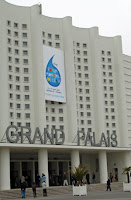There was a certain sense of excitement around the Forum and the slogan ‘a time for solutions’, set the tone. It’s time for post MDGs and Rio+20. As a result, a few trendy words and concepts were floating around: the green economy, the human right to water, the water-energy-food nexus. There was a widespread belief that we need to rethink and renovate the global water governance system. And the human right to water is certainly seen as a way to improve ways to monitor access to water and sanitation or as a strong norm and safeguard against the technological driven green economy agenda.
Overall, many participants emphasized that something new was needed and that we are at a critical juncture in the way water should be managed and governed. However, one should not get carried away in our way of looking forward without looking back. This is what we did in our session, in part as a way to critically reflect on how global water governance is evolving.
Interestingly, one can see this tendency again to dichotomise how water should be approached. While debates 20 years ago were around water as a human right versus water as an economic good, one can again see a tendency to oppose the human right approach to the green economy. At the same time, if human right and equity are considered as central to new monitoring systems, other critics will argue that human rights has been mainstreamed, a little bit like the concept of green economy right now.
Looking backwards, one can see that dichotomising or mainstreaming key concepts have polarised and in some ways limited the debate and failed to recognize the complexity and multi-dimensional aspects of water.
However, the most worrying aspect is the failure to recognise the limits of global collective action and the ‘business as usual’ scenario that these multi-stakeholders forum have the capacity to generate and address global water issues. Isn’t it time to question to what extent these forums are effective in addressing and improving global water governance? Are these not a mascarade to cover for the lack of commitment by governments to address these fundamental issues?
In the forum gazette no. 2, Sujiro Seam wrote an editorial on the commitment of political leaders to the Forum and how this political process constitute a crucial component to define the priorities for water in the perspective of the upcoming Earth Summit 2012.
But the commitments by these governments are non-binding and we are at the Sixth World Water Forum hoping for a sea of change from unfortunately nowhere…until we address questions of accountability, these multi-stakeholder forums will not be about decision time!
